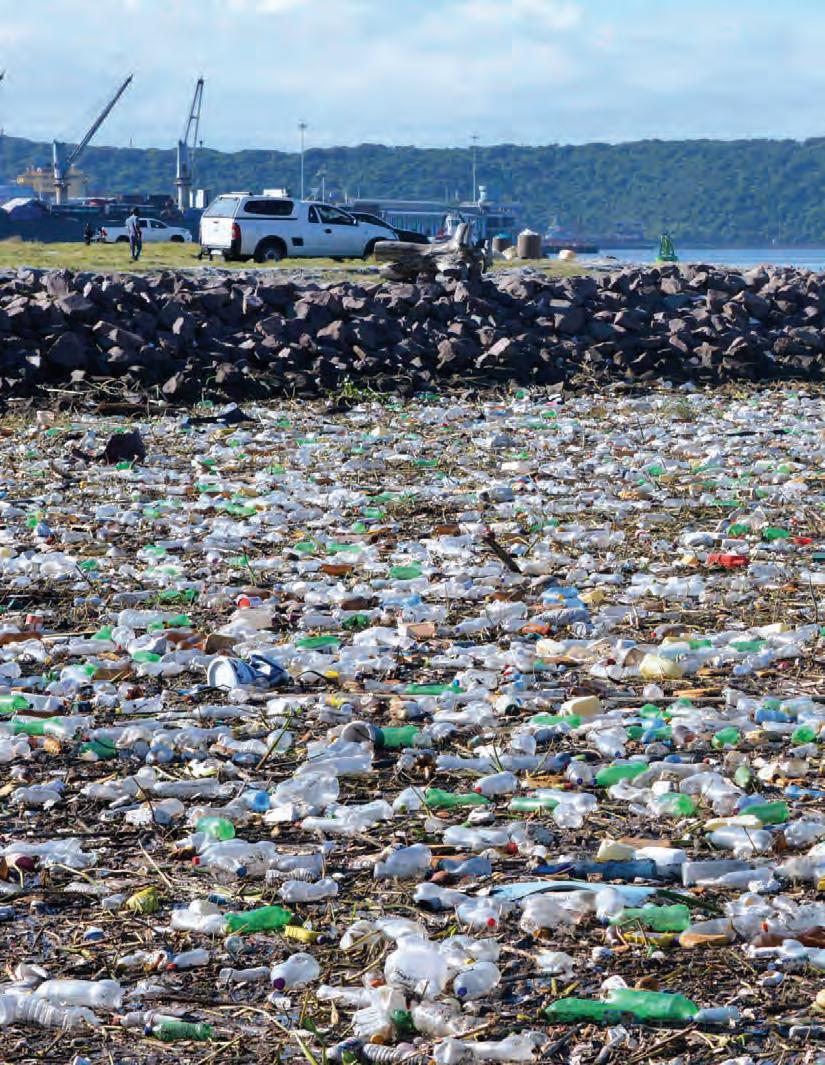
3 minute read
Rivers are vital monitors of corporate health, but we all need to work together to solve the problem
from KZN Invest 9
Janet Simpkins is an ecoactivist and the director of Adopt-a-River, an organisation that monitors KZN river pollution and does regular river clean-ups. We spoke to her about what companies and consumers can do to clean up.
Q: Rivers provide a barometer of the ecological health of the region. How healthy is KZN, based on how much your teams pull out of the rivers and on water tests conducted?
Advertisement
A: Sadly, the health of our rivers countrywide – not only in KZN – are in serious need of intervention. There isn’t a day that goes by that we don’t hear of yet another sewerage spill into a river, which either flows into a dam or the ocean. Sewerage is the most concerning for me – it’s not the kind of waste you can just “pick up”. Its effect on the ecosystem and communities that rely on the water is often devastating if left unchecked. Hopefully, with the focus on the tracing of Covid-19 hotspots through our sewerage systems, a task being undertaken by the Water Research Commission, this might draw some attention to the largely dysfunctional wastewater treatment facilities. Solid waste is a constant in what used to be beautiful natural environments but are now polluted and in some cases choked with (mainly) plastic.
Save our HEALTH
Q: The Adreach team at Blue Lagoon consists of five people working six hours a day, four days a week and have collected over 11 000 refuse bags in nine months. What does that sa y about the failure of waste separation upstream?
A: The failure upstream is a waste management problem, the lack of formal waste collection in informal settlements is a huge contributor to what lands up in the river. Illegal dumping is another.
Q: Having been involved with a team in the Mkhambathini Municipality area dealing mainly with disposable nappy dumping, what is the solution?
A: Major intervention with all stakeholders is required. This will require action from mainly municipality and community engagement to change behaviour and put into place alternative options for disposal.
Q: What kind of funding do you require in order to make a difference? We can make a big difference with very little. R100 pays for an E. coli sample to ensure we have accurate information about the health of the river that isn’t visible to the naked eye. R1 000 can buy much needed equipment, R10 000 would allow a river team to work for an extra month, and anything over that can be used in a myriad of ways. Working together with municipalities and networking with other organisations in the same field allows us to get the funds to where they are needed most and maximise the impact.
Q: You say that the bulk of what is flushed down rivers and washed up on beaches are plastic cold drink bottles produced by Coca-Cola Beverages South Africa. Are you aware of what the company is doing to ameliorate its detrimental environmental impact?
A: Yes, they are a major contributor to the collected waste. I have engaged with the company on their environmental efforts, but to date I have not been able to get a satisfactory response on what they are doing to combat their waste landing up in the rivers and then on the beaches and in the sea. They asked that I contact some people on the ground in KZN, but it’s been a run-around finding the right person. Greater effort needs to be made to ensure the plastic bottle has a higher


ABOVE: JANET SIMPKINS – A DIRECTOR OF ADOPT-A-RIVER.
value than simply wanting to dump it. If they worked on an effective solution at the source, we wouldn’t have to deal with as many bottles in the sea. Q River clean-ups are a wonderful response to the ghastly mess, but they aren’t the answer. How do you address this problem at the source? Do we have to demand retailers publicly audit their use of plastic packaging and take responsibility for collecting it? A The clean-ups are definitely just a short-term intervention in an effort to stop the waste from entering our water sources and ocean. The government needs to address how we deal with waste and recycling, from bylaws right through to changing how we package. Corporates can also actively change the status quo – how about some new-age thinking in returning and reusing? Thirdly, consumers need to start to refuse. Ask for an alternative to polystyrene and take-away packaging, for alternatives to plastic bags, take your own coffee cup! Imagine if everyone changed one thing. *










